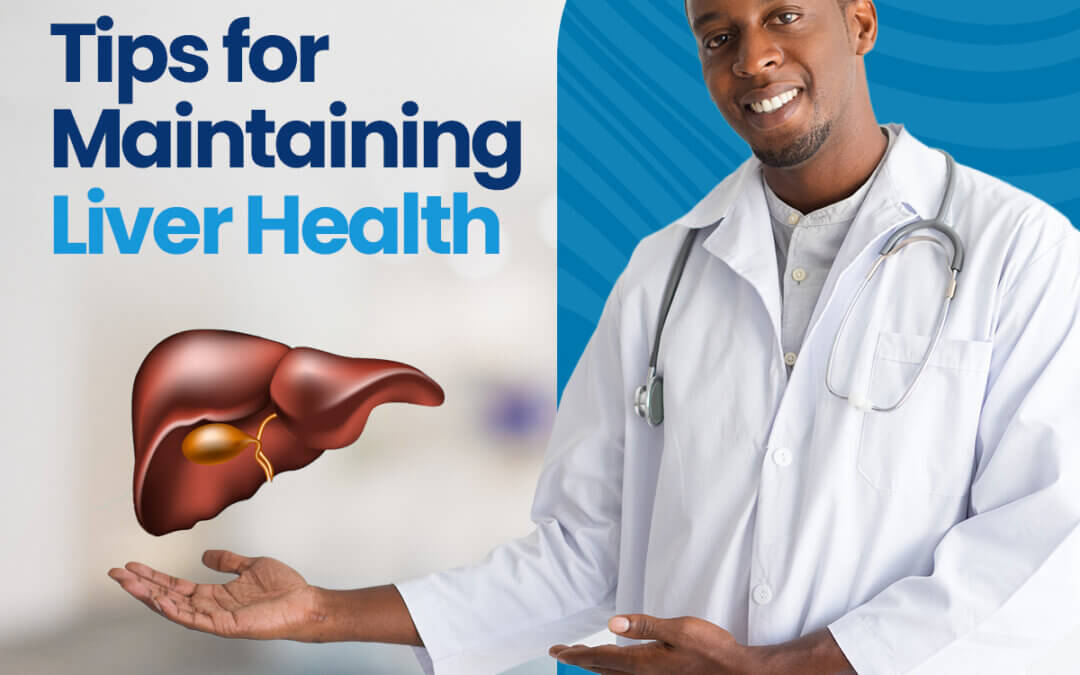Share this blog post with your friends
Taking care of your liver is essential for overall health and well-being. Here are some simple and practical tips to maintain a healthy liver:
Continue to be active: Get moving and do some physical activity on a regular basis. Exercise does not have to be difficult; activities such as walking, cycling, or dancing can be both pleasurable and helpful to your liver.
Eat a balanced diet: Consume a well-balanced diet that includes a range of colourful fruits and vegetables, healthy grains, and lean proteins. Choose foods that are good for your liver, such as garlic, turmeric, green tea, and leafy greens. Reduce your intake of processed foods, sugary snacks, and harmful fats.
Hydrate, hydrate, hydrate: Drink plenty of water throughout the day to support optimal liver function and overall health. Aim for at least eight glasses of water daily.
Limit alcohol intake: Alcohol can be harsh on the liver, so it’s important to drink in moderation. If you choose to drink, do so responsibly and be mindful of the recommended limits.
Be cautious with medications: Follow your healthcare provider’s instructions when taking prescription or over-the-counter medications. Avoid self-medication and consult a professional if you have concerns about potential liver-related side effects.
Maintain a healthy weight: A healthy weight can be achieved and maintained by a mix of regular activity and a well-balanced diet. Obesity can contribute to fatty liver disease, so practice portion management and careful eating.
Protect yourself from hepatitis: Protect yourself from hepatitis by using safe sex, not sharing needles, and getting the appropriate hepatitis A and B immunizations. These precautions can aid in the prevention of hepatitis infections, which can cause liver damage.
Reduce your exposure to toxins: Avoid contact with chemicals, pollutants, and other toxins that can harm your liver. When working with chemicals, take precautions and keep your living and working areas well-ventilated.
Seeking Medical Advice
When it comes to your liver health, it’s important to seek medical advice from qualified healthcare professionals. While general tips can be helpful, everyone’s situation is unique, and a healthcare provider can offer personalized guidance. If you have specific concerns about your liver or need specialized care, consider the following steps:
Consult with your primary care physician: Start by scheduling an appointment with your primary care doctor. They can assess your overall health, discuss any symptoms or concerns you may have, and provide initial guidance on liver health.
Request a referral to a liver specialist: If your primary care doctor determines that you need specialized care for liver-related issues, they can refer you to a hepatologist or gastroenterologist. These specialists have in-depth knowledge and experience in diagnosing and treating liver conditions.
Seek recommendations: Reach out to friends, family, or trusted healthcare professionals for recommendations on liver specialists in your area. Their personal experiences can provide valuable insights and help you find a reputable specialist.
Research online resources: Utilize reliable online resources to find liver specialists near you. Websites of reputable medical institutions, directories of healthcare providers, and patient review platforms can help you identify qualified specialists in your area.
Contact local liver clinics or hospitals: Get in touch with liver clinics or hospitals in your region and inquire about their liver health services. They can provide information on the specialists they have on staff and guide you through the process of making an appointment.
Remember, seeking medical advice is crucial for accurate diagnosis, personalized treatment plans, and ongoing monitoring of your liver health. Don’t hesitate to reach out to healthcare professionals who specialize in liver health for the best care possible. Your liver’s well-being is important, and getting the right support can make a significant difference in your overall health.
In conclusion, it’s clear that our liver is a crucial part of our overall health. Taking care of it should be a top priority. Here’s a recap of what we’ve discussed and some steps you can take to maintain a healthy liver:
Live a healthy lifestyle: Maintain a healthy lifestyle by staying active, maintaining a healthy weight, and learning stress management techniques. Simple lifestyle changes might have a significant impact on your liver health.
Eat a balanced diet: Eat a well-balanced diet that includes a range of healthful foods such as fruits, vegetables, whole grains, and lean proteins. Limit your intake of processed foods, saturated fats, and added sweets. Your liver will be grateful!
Stay hydrated: Drinking plenty of water is essential for maintaining your liver in good working order. It aids digestion and detoxification, so keep that water bottle on hand.
Go easy on the alcohol: Drinking too much alcohol can wreak havoc on your liver. If you choose to drink, do so in moderation and give your liver a break every now and then.
Say no to risky behaviours: Avoid drug abuse and any other behaviours that can harm your liver. Your liver works hard to keep you healthy, so show it some love by making smart choices.
Remember, it’s always a good idea to consult with healthcare professionals if you have specific concerns or symptoms related to your liver. They can provide personalized advice and guidance based on your unique situation.
By following these tips and making liver health a priority, you can reduce the risk of liver diseases and enjoy a better quality of life. So, take charge of your liver health today and start making positive changes by booking a session with us synlab. Your liver will thank you, and you’ll feel the benefits of a healthier, happier you.

